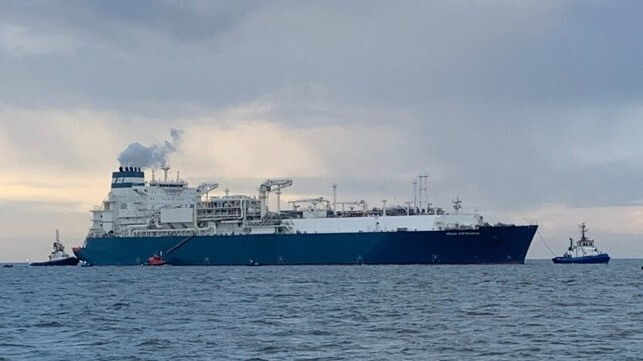Germany’s First FSRU Arrives with Initial Import LNG Cargo

Germany’s first FSRU for the LNG operation at Wilhelmshaven arrived in the port this afternoon, December 15, ahead of beginning operations on December 17. It marked a key milestone in an effort that began less than 10 months ago to accelerate plans for an LNG import operation to replace Russian sourced gas supplies.
The 92,000 dwt Höegh Esperanza, with a capacity of 165,000m cbm of liquefied natural gas (LNG) docked at the terminal developed by Uniper with the support of the federal government. At the same time, the vessel’s owner, Höegh LNG, confirmed that it had executed a 10-year charter with the German government with Uniper as the operator for the floating storage and regasification operation.
The 965-foot vessel, which entered service in 2018, had recently been in Brest, France where it had undergone early maintenance and necessary modifications. It then proceeded to Spain where it took aboard an initial load of LNG before proceeding to the German port.
“There is still a lot to do before the first gas can flow in a few days,” said Holger Kreetz, COO Asset Management at Uniper. “Nevertheless, after ten months of intensive work, it is a great moment to see the Höegh Esperanza dock here.”
After unloading its first cargo, the Höegh Esperanza’s task will be to regasify delivered LNG and to feed at least five bcm of natural gas into the German gas grid each year. According to Uniper, that is around six percent of Germany's gas demand and will replace around eleven percent of Germany's gas imports from Russia.
The German government chartered five vessels to operate as FSRUs and separately Deutsche ReGas also chartered a vessel with TotalEnergies to start a privately funded LNG import operation at the eastern port of Lubmin. That FSRU unit arrived in Germany on November 23 to prepare for its operation. Deutsche ReGas is awaiting final permits and is confident that it will start operations before the end of 2022. The government is also supporting RWE which is developing another LNG import terminal in northwestern Germany at Brunsbuttel on the mouth of the Elbe River. RWE expects that its FSRU operation will commence in January 2023.

that matters most
Get the latest maritime news delivered to your inbox daily.
Uniper highlights that the plan for the LNG import terminal at Wilhelmshaven had been developed several years ago but was not considered economically viable. The German government accelerated the plans in the spring of 2022 in its efforts to replace the supply of Russian gas. Uniper expects that 70 LNG tankers a year will arrive at Wilhelmshaven. Each vessel will be able to transport 170,000 cbm of liquefied gas which the company says will supply 50,000–90,000 German households.
Longer term, Uniper looks to transition its operations at Wilhelmshaven into a green port. By the second half of this decade, they expect to begin importing large quantities of green hydrogen to Germany via Wilhelmshaven in the form of ammonia. They are also planning to develop an electrolyzer with a capacity of up to 1000 MW, which will produce hydrogen from offshore wind energy.
